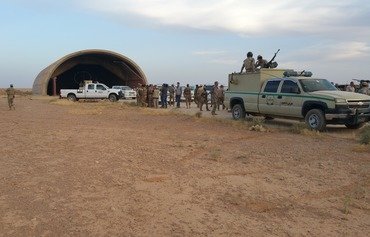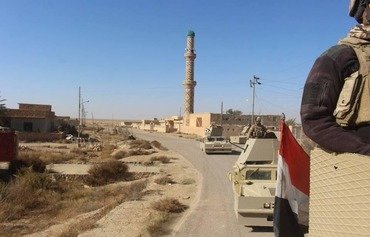Joint Iraqi forces have driven "Islamic State of Iraq and the Levant" (ISIL) fighters from seven areas in western Anbar near the border with Syria during an ongoing offensive that began January 5th, military officials said.
Led by al-Jazeera and al-Badiya Operations Command, the army's 7th division, police and fighters from local tribes, the offensive has so far managed to liberate areas from Haditha to Anah, al-Jazeera operations commander Maj. Gen. Qassim al-Mohammedi told Diyaruna.
ISIL fighters have been ousted from the areas of al-Tilal, al-Wadi, al-Sakra, al-Anaz, al-Zawiya, al-Jaaf and al-Hadaba, he said.
"Dozens of ISIL fighters have been killed in the offensive, six car bombs have been detonated, and a fuel depot at the entrance to the city of Anah has been blown up," al-Mohammedi said.
Security forces are now gathered at the intersection of Anah and Rayhana ahead of a push towards the centre of Anah, he said.
Meanwhile, troops are advancing in al-Sahla area, 40 kilometres from the centre of al-Qaim district, he added.
Evacuating families
More than 200 families from these areas have been evacuated in military vehicles and brought to the 60-Kilo area east of al-Rutba and a camp west of Ramadi, Anbar police chief Maj. Gen. Hadi Kassar Erzaij told Diyaruna.
One of the main tasks of the security forces has been to evacuate families from targeted areas in the districts of Anah, Rawa and al-Qaim, he said.
In addition to those three main areas, Iraqi forces still need to liberate the Rayhana and Obaidi areas, he said.
"ISIL has not engaged in open fighting with the Iraqi troops, and opted instead for rocket attacks, suicide bombers, mortar shelling, and maneuvering in order to flee the battle," he said.
Anbar's local government has been arming tribal fighters so they can hold the territory and support Iraqi forces in maintaining security in liberated areas, Anbar provincial council head Ahmed Hamid al-Alwani told Diyaruna.
Service departments also have been providing food, humanitarian aid and medical services to the displaced population, he said.
Meanwhile, more tents have been erected in reception centres to accommodate the expected waves of displacement as the battles progress to more areas in Anbar, he added.
Positive economic impact
"Clearing al-Qaim on the border with Syria, as well as Rawa and Anah, will have a positive impact on reopening the other border crossings, securing the international highway, and restoring life in western areas," al-Alwani said.
These areas "have been ruined by this criminal group", he said.
"Anbar in the last three years has suffered major losses, estimated at 250 billion Iraqi dinars ($212.4 million)," he said.
The closure of the crossings with Syria and Jordan has brought cross-border trade to a standstill, he added, and the international highway, "a major economic lifeline for the people of Anbar", has not been used to transport goods.

![The Anbar police tactical regiment has been working to oust 'Islamic State of Iraq and the Levant' fighters from the westernmost part of the province. [Saif Ahmed/Diyaruna]](/cnmi_di/images/2017/01/27/7101-Anbar-tactical-forces-600_384.jpg)





